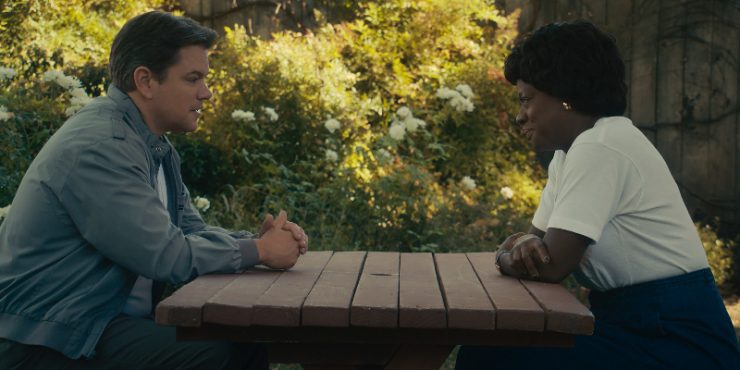Jason Hehir’s documentary mini-series The Last Dance proved that we are still very much interested in the mythology of Michael Jordan. The Greatest of All Time (GOAT) mesmerized millions of viewers in the Summer of 2020, when we all needed something to distract us from the double turbulence of COVID-ravaged shutdowns and nationwide protests of police violence. It was a balm but it was also riveting. Jordan’s clinical competitiveness is worth examining in ways that The Last Dance chooses not to. It’s obvious that Hehir traded true deconstruction of Jordan’s behavior for access to Jordan himself, a trade that’s a no brainer for any filmmaker who hopes to reach a broad audience. But The Last Dance only reinforces the mythology, it doesn’t make any meaningful interpretations.
Ben Affleck’s Air takes it a step further. As a character, Michael Jordan doesn’t even appear in any meaningful way. At most, we see an unfocused profile, the back of his head. Two words of dialogue are softly muttered. Affleck is making a tactical choice here; Air is even more about the mythology than The Last Dance was. The film has no interest in Jordan as a human but as a superhuman. Casting an actor in this part would destroy the effect immediately. Who could possibly fill those shoes? (No pun intended.) The decision is a wise one in theory, though in execution Air maybe stretches the conceit further than it can really handle. Affleck casts himself in the role of Phil Knight, Nike founder and espouser of second-rate Eastern philosophy that contrasts all of his opulent capitalist success. But Knight is a secondary figure. The main character is Sonny Vaccaro, played by Affleck’s BFF Matt Damon.
Vaccaro’s place in Nike is hard to define, but his main job is scouting talent for the company’s basketball division. A far cry from Nike’s current imperial dominance in the basketball shoe industry, in 1984, Nike was a far third behind the industry standard of Converse and the hip-hop-endorsed coolness of Adidas. After the ’84 draft, marketing director Rob Strasser (Jason Bateman) asks his team to pick Nike’s next stars. Vaccaro wants Jordan, but not only is the college phenom too expensive, but he’s already shown a strong preference for Adidas. Watching further tape of Jordan’s play in North Carolina, Vacarro decides to dig in his heels. There’s no point in recruiting several secondary talents, he wants to go full offensive for Jordan. His insistence only further alienates Rob and Phil Knight.
Chasing Jordan will cost extra money in a time where a newly enshrined Board of Directors is asking Phil to cut costs. Missing out on Jordan could mean the end of Nike’s basketball division, but that’s a risk Sonny is willing to take. When Sonny talks to Jordan’s agent, David Falk (Chris Messina, playing the mega-agent as a full blown sociopath), he gets a furnace blast of smarmy rejection. Jordan has no interest in Nike and doesn’t even want to entertain a meeting, David explains. Desperate, Sonny chooses an unorthodox option: traveling to North Carolina and visiting Jordan’s parents, James (Julius Tennon) and Deloris (a supreme Viola Davis). The Jordans are non-plussed at seeing a strange man at their home, but Deloris allows Sonny to make his case, and he proves convincing and personable.
Bypassing agents and going directly to the parents is considered a career-killing faux pas, but Sonny’s gamble pays off, winning Nike a meeting and a chance to sell Jordan on their game-changing campaign: Air Jordan. Part of the charm of a movie like Air is how it takes a monolithic business like Nike and rearranges its history to present it as an underdog. I’ve read enough to know that Vaccaro’s pursuit of Jordan is a legitimately interesting story with genuine intrigue, but Air too often rigs the game. It gets insecure in the nuances of its story and stacks the deck dramatically, giving the audience little choice in the matter. The film’s persistent statements of purpose seems to fly in the face of the scrappy company it’s trying to present. Most of the time Air is winking at you for knowing how this is all going to play out.
As much as you don’t expect The Last Dance to take serious inventory of Michael Jordan’s less flattering personality traits, you also probably don’t walk into a screening of Air to get the darker details of Vaccaro’s commercialization of high school basketball and the damaging effect it has had on some kids. The film does mention in a post-script the instrumental role Vaccaro played in allowing college athletes to be compensated for their name, image and likeness. The point being that Vaccaro (like Jordan) is a complicated man, but he’s also the protagonist of a film that treats that kind of complication like the plague. Instead, Affleck substitutes contrived emotional stakes. In the middle of the movie, Bateman’s Strassman gets a speech about how this pitch could effect his relationship with his estranged daughter. Putting aside the fact that Bateman actually delivers the speech rather well, it’s still a prime example of Air flattening its emotional effect through inflating its own importance.
Air is the first film from Artists Equity, a production company started by Damon and Affleck meant to revolutionize the profit sharing mechanism in the film industry. Hearing Affleck describe it, the plan is that all involved in making the film – not just above-the-line talent – will share in the profits of a film’s success, in an attempt to adjust to the changing industry landscape (see: streaming). The plan, utopian in nature, seems well-meaning even if Hollywood history is rife with stories of “revolutionary” companies that end up reinforcing the very industry behavior they meant to disrupt. In my mind, the only obligation that Artists Equity had is toward quality, entertaining stories. Air has the pedigree to be a crowd-pleaser, but one would hope that there next project is something of more legitimate substance.
Directed by Ben Affleck










